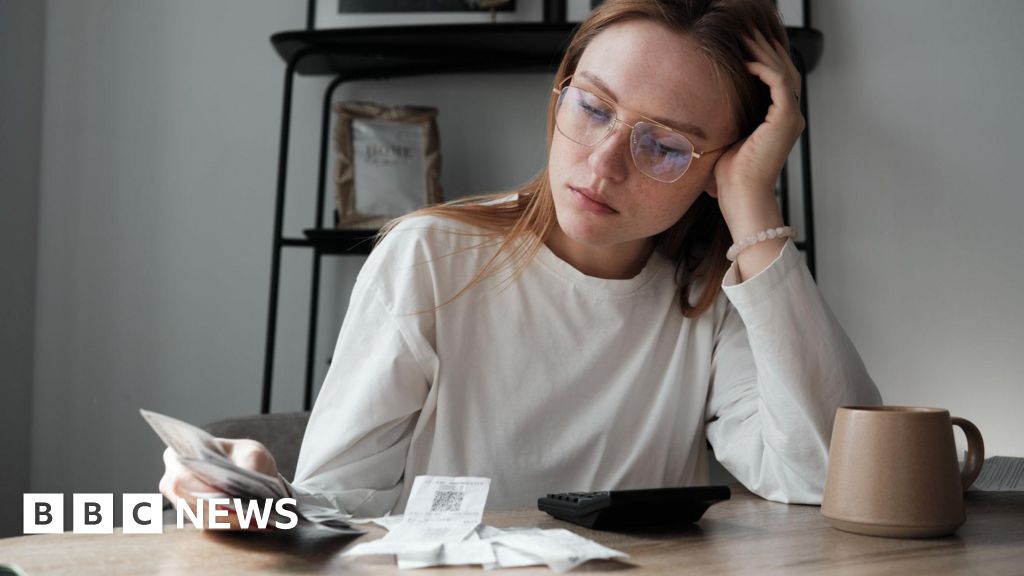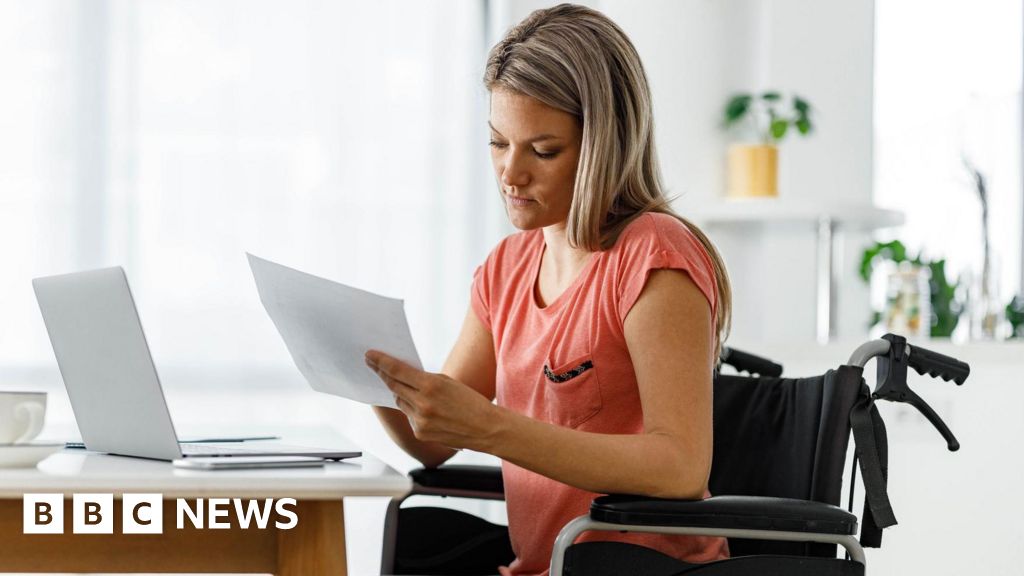Matt Hancock ‘was not told about eat out to help out scheme until day it was announced’ – as it happened | Politics
- Politics
- November 30, 2023
- No Comment
- 156
Hancock says he was not told about eat out to help out scheme until day it was announced
Hancock says he did not know about the eat out to help out scheme until the cabinet meeting on the day it was announced.
Q: If you had been told about it in advance, what would you have said?
I don’t know, Hancock says.
Q: But as secretary of state you were plainly on the side of caution.
Hancock says it was important, overall, to ensure there was not too much opening up.
What mattered in the opening then was that there wasn’t overall too much. And in the end, there was overall too much. Which individual items you have opening, you did or didn’t do, is second order compared to the overall amount of openings.
But he says at the time he was also trying to get funding to help people who tested positive to isolate.
(Hancock seems to be implying that he had a reason not to pick a fight with the Treasury, but he does not say that explicitly.)
Q: Did you express reservations about it?
Hancock says he argued against it being extended. And it was not extended.
He says the government had an R budget, and it could introduce various measures as long as collectively they did not push R above one.
He repeats the point about wanting money from the Treasury, this time saying explicity that he was motivated by the desire to keep the chancellor on side.
UPDATE: Hancock said:
In intervention areas, it was unhelpful to be that the state should be subsidising people to go out at the same time as asking people to be more cautious.
But what I’d say is that I think there has been undue focus on this one item.
And where the then chancellor is absolutely right in his statement, is he argues that this was not the sole cause of the second wave …
In the end that loosening was too much. Eat out to help out was just one of many measures.
Key events
-
Afternoon summary
-
Hancock says he was not told about eat out to help out scheme until day it was announced
-
Hancock’s media adviser questioned his claim goverment had ‘locked down care homes before rest of country’, inquiry told
-
Hancock accepts comment about throwing ‘protective ring’ about care homes gave wrong impression
-
Cabinet secretary Mark Sedwill thought Hancock hit testing target via ‘creative counting’, inquiry hears
-
Hancock says there’s ‘spectacular imbalance’ between spending to counter military threats and health threats
-
Alba party calls for referendum on giving Scottish parliament power to negotiate independence
-
Hancock defends saying increasing testing and contact tracing ‘in hand’ on 14 March 2020
-
Hancock says lockdown decision held up for about two weeks by concern people would get tired of complying
-
Hancock says, with hindsight, lockdown should have started on 2 March 2020, cutting death toll in first wave by 90%
-
Politicians from across political spectrum pay tribute to Alistair Darling
-
Starmer pays tribute to Darling, saying his ‘calm expertise and honesty’ helped UK through financial crisis
-
Former Labour chancellor Alistair Darling has died, aged 70, his family says
-
Hancock says Cummings created ‘culture of fear’ in No 10 which undermined effectiveness of Covid response
-
Hancock denies being liar and says Cummings to blame for ‘toxic culture’ in No 10
-
Hancock says his ‘single biggest regret’ is not insisting on policy being based on assumption of asymptomatic transmission
-
Sunak claims he is ‘not in hock to ideological zealots’ over climate crisis
-
No written evidence to support Hancock’s claim he told Johnson on 13 March 2020 to order lockdown, inquiry hears
-
Hancock claimed UK ‘better prepared than other countries’ for Covid on 12 March 2020, inquiry hears
-
Hancock dismisses claims he was over-confident, saying he had to keep system ‘driving forward’
-
Hancock says he was trying to ‘raise the alarm’ about Covid early, but ignored by No 10
-
Hancock claims diary evidence showing DHSC was seen by No 10 as chaotic shows there was ‘toxic culture’ in Downing Street
-
Matt Hancock starts giving evidence to Covid inquiry
-
Boris Johnson to give evidence to Covid inquiry all Wednesday and Thursday next week, inquiry says
-
Dominic Cummings’ list of examples of when he says Hancock lied to No 10 about Covid
-
What previous witnesses to Covid inquiry have said about Hancock
-
Matt Hancock appears at Covid inquiry
Afternoon summary
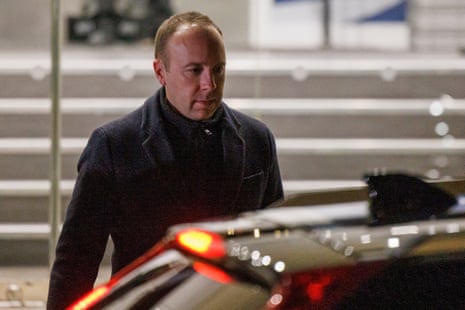
Q: Did you back calls for a circuit breaker lockdown in September 2020?
Hancock says he favoured tougher measures at the time. But he was not in favour of the circuit breaker plan.
Repeat circuit breakers would have undermined public confidence, he says.
Covid rates would just have shot up afterwards. That is what happened in Wales, he says.
Q: Why did you not back the scientists?
Hancock says at that point the scientists were not unanimous.
Q: Sage called for a circuit breaker on 17 September.
Hancock says the chief medical officer’s view at the time was “subtly different”.
Circuit breakers would not have worked in practice, he says.
Q: On 17 September you could not have known the Welsh lockdown did not work, because it had not been tried. Weren’t you meant to be following the science?
No, says Hancock. He says guided by the science, which was different.
And that’s the end of the hearing for the day.
Keith shows the inquiry text messages between Hancock and Simon Case, the cabinet secretary, from August 2020 showing that the Treasury and No 10 were warned at the time that the eat out to help out scheme was pushing up Covid cases.
Hancock defends not saying this publicly, saying he abided by collective responsibility.
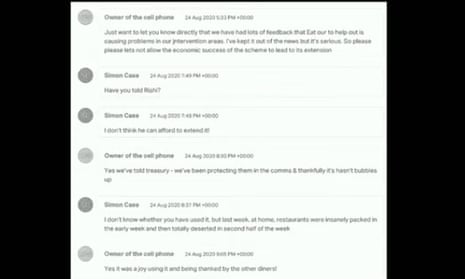
Hancock says he was not told about eat out to help out scheme until day it was announced
Hancock says he did not know about the eat out to help out scheme until the cabinet meeting on the day it was announced.
Q: If you had been told about it in advance, what would you have said?
I don’t know, Hancock says.
Q: But as secretary of state you were plainly on the side of caution.
Hancock says it was important, overall, to ensure there was not too much opening up.
What mattered in the opening then was that there wasn’t overall too much. And in the end, there was overall too much. Which individual items you have opening, you did or didn’t do, is second order compared to the overall amount of openings.
But he says at the time he was also trying to get funding to help people who tested positive to isolate.
(Hancock seems to be implying that he had a reason not to pick a fight with the Treasury, but he does not say that explicitly.)
Q: Did you express reservations about it?
Hancock says he argued against it being extended. And it was not extended.
He says the government had an R budget, and it could introduce various measures as long as collectively they did not push R above one.
He repeats the point about wanting money from the Treasury, this time saying explicity that he was motivated by the desire to keep the chancellor on side.
UPDATE: Hancock said:
In intervention areas, it was unhelpful to be that the state should be subsidising people to go out at the same time as asking people to be more cautious.
But what I’d say is that I think there has been undue focus on this one item.
And where the then chancellor is absolutely right in his statement, is he argues that this was not the sole cause of the second wave …
In the end that loosening was too much. Eat out to help out was just one of many measures.
Hancock’s media adviser questioned his claim goverment had ‘locked down care homes before rest of country’, inquiry told
Keith showed the inquiry an exchange of messages showing that on 13 May 2020 Hancock’s media adviser, Jamie Njoku-Goodwin, told Hancock he was concerned that there was little evidence to justify Hancock telling Boris Johnson the government had “locked down care homes before the rest of the country”.
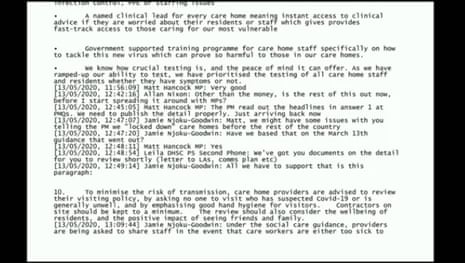
Hancock accepts comment about throwing ‘protective ring’ about care homes gave wrong impression
Keith says on 15 May Hancock said at a No 10 press conference:
Right from the start, we’ve tried to throw a protective ring around our care homes.
Q: Do you accept that that was open to misinterpretation, and that that implied protections were in place at the start?
Hancock says he understands “why people feel strongly about this”. At the press conference he went on to explain what he meant. He had listed measures being taken by the government.
He was trying to summarise the measures being taken.
Q: Prof Van-Tam says a ring is a circle without a break? But the measures were not an unbroken circle of protection.
Hancock says Van-Tam is right.
Cabinet secretary Mark Sedwill thought Hancock hit testing target via ‘creative counting’, inquiry hears
Keith shows Hancock a message he got from Mark Sedwill on 1 May 2020 congratulating him on meeting his target to get testing up to 100,000 tests per day. It was widely said that Hancock only met this target by fiddling the methodology, and Sedwill seems to acknowledge this, congratulating Hancock on “creative counting”.
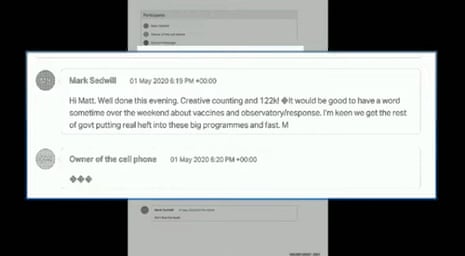
Asked if he was engaged in creative counting, Hancock rejects that. He says he achieved the target on every possible measure.
Hancock says there’s ‘spectacular imbalance’ between spending to counter military threats and health threats
Hancock says the government spends £50bn on defence. But it spends less than £500m on the UK Health Security Agency. That is less than 1% of spending going on health security.
Yet health security failings have killed more civilians than terrorism has, he says. He says that is a “spectacular imbalance”.
And he says the head of UKHSA should sit in on the national security council the whole time, instead of just when health topics are being discussed.
Referring to what he said earlier about initially being refused permission to hold a Cobra meeting in January (see 12.36am), he says that if he had gone to the cabinet secretary and said there was a 50/50 chance of a terror attack killing 100,000 people, there would have been a Cobra meeting – and the PM would have chaired it.
Keith asks about Public Health England.
Hancock says its scientific work was superb. At one point it was doing half the genomic sequencing in the world.
But it did not have the capacity to scale up, he says.
And he says it did not want to engage with private companies able to help expand testing capacity.
Back at the Covid inquiry, Hugo Keith KC shows Hancock a paper with referenes to what was said at Sage at various points about what damage might be done to the NHS by a pandemic. Here is one entry.
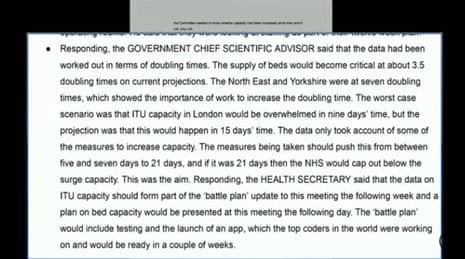
Q: Did the government have a view as to when the NHS would be overwhelmed?
Hancock says no one fully knew what that would look like, “but we knew it would be catastrophic”.
This would mean people going without treatment, Hancock says. And he says he was determined that would not happen.
He says the crisis point would depend on various factors, like staffing ratios. In intensive care it is normally one member of staff to one patient. During Covid, at some points that went up to one to six patients.
The NHS would have survived, he says.
But he says, if it had been overwhelmed, it would not have been able to offer care to everyone.
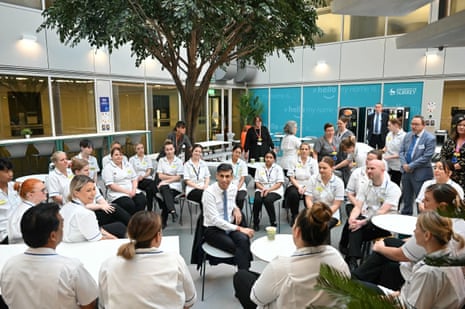
Alba party calls for referendum on giving Scottish parliament power to negotiate independence

Libby Brooks
In a move that appears as much designed to further annoy the SNP government as advance the cause of independence, Alex Salmond’s Alba party is proposing a referendum on whether the powers of the Scottish parliament should be extended to include the power to legislate for and negotiate independence.
The former SNP leadership candidate Ash Regan, who defected to Alba last month, told a press conference this morning that she would introduce a member’s bill to consult the people of Scotland 10 years on from the 2014 independence referendum.
But Regan admitted that she had not yet spoken to any fellow MSPs about her plan – a member’s bill needs 18 proposers from three parties – but said she saw “no reason” why the Scottish government wouldn’t back it. She did this while sitting alongside the Alba leader, Alex Salmond, who last week launched a multi-million pound damages claim against the very same Scottish government.
Regan also noted that the parliament’s non-government bills department is already “at capacity”.
Salmond boasted that “hardly a day goes by” when he doesn’t speak to SNP parliamentarians, but would not name any SNP MSPs he thought likely to support the bill.
Salmond also revealed that the proposed bill had been his plan B in 2012 in the event of David Cameron refusing an independence referendum.
Both Salmond and Regan insisted their plan, which includes a “consultation” with the wider independence movement, would break the constitutional logjam around a route to another referendum.
At SNP conference in October, the party leader and first minister Humza Yousaf urged members to stop talking about process and convince voters how independence was relevant to the cost of living crisis. The party also agreed that if the SNP wins a majority of Scotland’s Westminster seats at the general election, it will have the mandate to negotiate independence with the UK government.
The Covid inquiry has stopped for a 10-minute break.
#Matt #Hancock #told #eat #scheme #day #announced #happened #Politics


